Why Use Pipe Insulation Blocks?
Pipe insulation blocks fit around a pipe to both insulate and provide load bearing support where clamps are applied when installing pipework. The contact between the clamp and pipe can lead to heat loss and condensation, hence the purpose of insulated pipe supports is to separate the pipework from the pipe clamp. This mitigates heat loss and thermal bridging within the installed pipework. Plus, insulation blocks provide a vapour barrier against moisture which can protect pipes from corrosion.
Lagging can be applied to pipework for the insulation of heated or chilled systems too, so pipe insulation blocks will help maintain the insulation integrity where pipe clamps are applied.
Considerations When Selecting Pipe Insulation Blocks?
Pipe Insulation Blocks will typically be specified according to the overall pipe insulation needed, load bearing capability and required fire resistance. So, generally M&E installers won’t actually have a choice in the pipe insulation blocks used, as they will instead be stipulated by the main contractor / mechanical consultant, especially as the industry moves towards a more compliant and safety-first approach.
However, where M&E installers do have a choice of which pipe insulation block to use, it can be easy to base their decision on experience and price, overlooking other factors which should also be considered! Including:
- Required level of insulation
- Compressive strength
- Reaction to fire / fire resistance
- Environment where the insulation block will be installed
- Recyclable /ecologically friendly
Some of the above can be affected by the actual pipe material, plus their proposed contents to run through them, including the contents temperature and volume.
Other considerations include; do the blocks include coverings, as many types include an outer foil layer as an extra vapour barrier, plus how thick do the insulation blocks need to be to maintain the required thickness / level of insulation around the pipe clamp. Often the insulation thickness and load bearing strength required will increase as the pipe sizes increase, although this is often interdependent with the other considerations already mentioned. Where compressive strength is an issue for some types of blocks this can be compensated by using split shells to provide additional protection to the pipe insulation block, along with the style of clamp used.
Types of Pipe Insulation Blocks
Up until recently Hardwood blocks were the only option when it came to pipe insulation blocks and the choice was simply between blocks from a sustainable wood source, certified by the Forest Stewardship Council (FSC®) and those which weren’t. However, as industry standards have become more robust and safety conscious, pipe support blocks insulating properties need to be far more efficient, with improved levels of fire resistance. And hardwood blocks just can’t match the new standards. Hence the recent increase in the types of pipe insulation blocks available such as Phenolic, Rockwool, Armacell, Calcium and Foamglas.
Hardwood Blocks
Hardwood blocks did a job for many years and but aren’t that thermally conductive (0.1W/mK), with BS 5970 actually outlining that they shouldn’t be used due to their poor insulation properties. Another big downside is their lack of fire resistance which has grown significantly in importance over the last few years. However, they are strong so still can be specified due to their strength. Although BS 5970 also mentions they should only be used when it can be proven alternative insulation block cannot be engineered to meet the load requirements. Available in thicknesses of 15mm 20mm, 25mm, 30m, 35mm, 40mm and 50m. View our Hardwood Block range.
Advantages of Hardwood Blocks:
- Low cost
- High load bearing strength
- Sturdy, so easy to store and transport
Disadvantages of Hardwood Blocks:
- Below expected insulation standards
- Non fire resistant
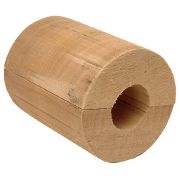
Phenolic Blocks
Made from load-bearing phenolic foam they provide great thermal insulation (0.021W/mK) offering energy saving benefits for heated or chilled systems as they restrict heat loss / gain. They can be used with Low Temperature, Hot Water (LTHW) as well as Chilled Water Systems (CHW) pipework between -50°C and 110°C. Phenolic blocks are medium cost option which offers support for compressive loads (density of 35-40 kg/m3). Although Phenolic foam is a combustible material it holds a fire classification of BL-S1, d0, which is a huge step up from hardwood blocks. They have a foil facing finish to provide an integral vapour barrier. Available in thicknesses of 15mm 20mm, 25mm, 30m, 35mm, 40mm and 50mm (other larger sizes available to order). View our Phenolic Block range.
Advantages of Phenolic Blocks:
- Leading low thermal conductivity value at a reasonable cost
- Can handle LTWH systems in compliance with the BS EN ISO 10211: 2007
Disadvantages of Phenolic Blocks:
- Doesn’t offer the same level of fire resistance as Rockwool blocks
- Need to be handled reasonably carefully to prevent damage
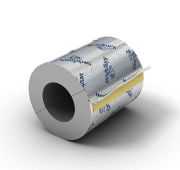
Rockwool Blocks
Manufactured from high density mineral wool that is non-combustible and has a high load bearing capacity. They can be used for most temperatures in pipework from 0 – 250°C, so are suitable for LTHW, CHW, plus Hot Temperature, Hot Water (HTHW) systems. Standard Rockwool blocks are A2 rated for their reaction to fire. However, they aren’t suitable for use in sub-zero temperatures. They have a foil facing finish to provide an integral vapour barrier. Offer reasonably low thermal insulation of approx. 0.049W/mK. Available in thicknesses of 20mm, 25mm, 30m, 35mm, 40mm and 50mm. View our Rockwool Block range.
Advantages of Rockwool Blocks:
- Non-combustible, leading A2 rated for reaction to fire
- Suitable for use with hot pipework up to 250°C
- Rockwool is approximately 97% recyclable
Disadvantages of Rockwool Blocks:
- One of the more expensive options
- Thermal conductivity not as efficient as Phenolic blocks
- Not suitable for sub-zero temperatures
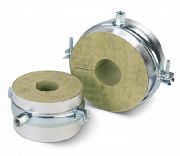
Armacell Blocks
ArmaFix Ecolight Blocks are innovative pipe supports made using 100% recycled PET plastic bottles with a good load bearing capacity (Density of 95-105kg/m3). They offer a combination of low thermal conductivity (0.033W/mK) value and leading water vapour resistance. With no extra external foil vapour barrier required like with Rockwool, Phenolic or Foamglas blocks. Suitable for LTHW, CHW systems with temperatures between 0 – 80°C. Armafix Ecolight blocks holds a fire classification of EN 13501-1 (Euroclass E) for the reaction to fire. Available in thicknesses of 13mm, 19mm and 25mm. View our Armacell Block range.
Advantages of Armacell Blocks:
- Low thermal conductivity value and leading water vapour resistance
- 100% recycled
Disadvantages of Armacell Blocks:
- One of the more expensive options along with Rockwool
- Maximum pipe temperature and resistance to fire not as high as Rockwool
- Blocks only available up to 25mm thick
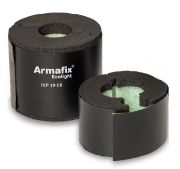
Foamglas Blocks
Made from Cellular Glass, a light weight yet rigid and durable insulation material, that’s composed of millions of completely sealed glass cells. They have a superior compressive strength (density 165kg/m3) and are non-combustible. Foamglas blocks are suitable for LTHW, CHW and HTHW systems with an impressive temperature resistance of -260 to 430°C. They have a foil facing finish to provide an integral vapour barrier. Offer a reasonably low thermal insulation of 0.048W/mK. Available in thicknesses of 20mm, 25mm, 30m, 35mm, 40mm and 50mm. View our Foamglas Block range.
Advantages of Foamglas Blocks:
- Non-Combustible
- Impressive temperature resistance between -260 to 430°C
- Superior compressive strength
Disadvantages of Foamglas Blocks:
- Thermal conductivity not as efficient as Phenolic blocks
- Lack of availability across common pipe sizes
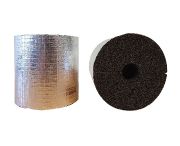
Calcium Blocks
Made from calcium silicate offering thermal efficiency on hot process applications (0.07W/mK). Suitable for LTHW, CHW and HTHW systems with a very high temperature resistance of up to 1050°C. Calcium silicate is non-combustible with a superior compressive strength (density 265kg/m3). Available in thicknesses of 20mm, 25mm, 30m and 40mm (other larger sizes available to order). View our Calcium Block range.
Advantages of Calcium Blocks
- Non-Combustible
- Impressive temperature resistance up to 1050°C
- Superior compressive strength
Disadvantages of Calcium Blocks:
- Thermal conductivity not as low as others (except Harwood blocks)
- Lack of availability across common pipe sizes
- Need to be handled reasonably carefully to prevent damage
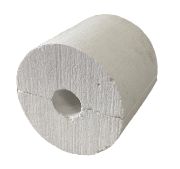
Which Pipe Insulation Block is Best?
As discussed throughout this post, the best pipe insulation block for M&E installers to use is dependent upon its application. From the type of pipe, contents of the pipe, required level of insulation, compressive strength needed to the level of fire resistance stipulated and the environment where the blocks will be installed.
Hopefully the summaries above will give M&E installers or specifiers a good indication of the type of pipe insulation block they should use. However before making a final choice, we’d always recommend reviewing product technical data to ensure the selected block is fit for purpose.
For further information check out our Pipe Insulation Blocks range. Alternatively contact our sales team on 01322 274226 or [email protected]